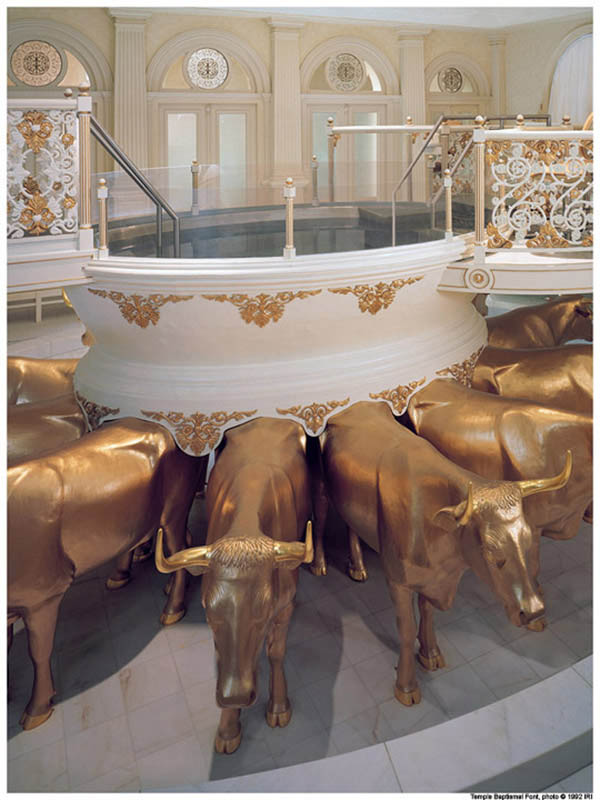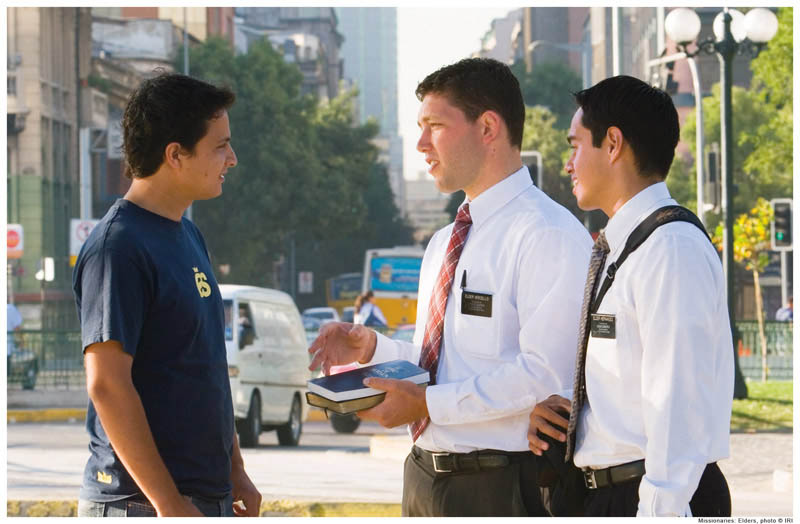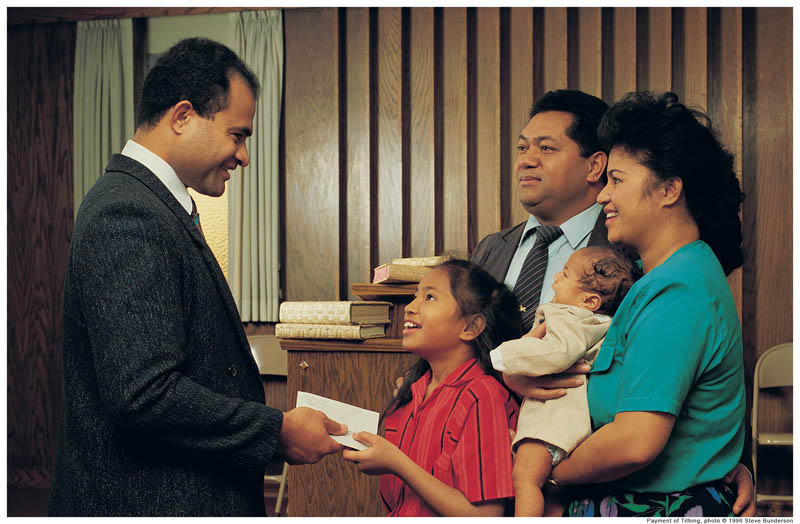Recent media stories have discussed some Mormon baptisms for the dead that targeted Holocaust victims and celebrities. Many have asked the Mormons to abandon the practice and wonder why the Church has not complied. Certainly, it would seem simpler to stop and end the publicity.
 In order to answer the question, the reader must understand some background concepts. First, it should be noted that Mormon is only a nickname for the people who belong to The Church of Jesus Christ of Latter-day Saints. The actual name of the Church offers an explanation as to why Mormons are not rushing to end the practice, but we’ll get to that later.
In order to answer the question, the reader must understand some background concepts. First, it should be noted that Mormon is only a nickname for the people who belong to The Church of Jesus Christ of Latter-day Saints. The actual name of the Church offers an explanation as to why Mormons are not rushing to end the practice, but we’ll get to that later.
First, let’s clarify just what baptism for the dead means and why it is necessary. Baptism for the dead is an ancient practice that Paul refers to as a current practice for the New Testament Christians.
Else what shall they do which are baptized for the dead, if the dead rise not at all? why are they then baptized for the dead? (1 Corinthians 15:29)
Paul offered this intriguing question while trying to convince people the resurrection of Jesus Christ—and of us all—is real. He reminded them that doing baptisms for the dead is a pointless activity if the dead don’t rise. It is obvious, since he didn’t elaborate on the practice, that everyone already knew what it was. A few have suggested that he was referring to a false practice, but no one uses a false practice to prove a true point. New Testament Christians were doing baptisms for the dead, a practice that continued until outlawed by the sixth canon of the Council of Carthage in A.D. 397. The fact that it had to be prohibited makes it clear it was a practice, one that had apparently been losing popularity during the apostasy that followed the deaths of Jesus Christ and of His apostles. But why did they do baptisms for the dead, and why do Mormons continue doing them?
Let’s take a look at what the Bible teaches about baptism:
Jesus answered, Verily, verily, I say unto thee, Except a man be born of water and of the Spirit, he cannot enter into the kingdom of God (John 3:5).
Jesus taught that baptism was mandatory for admission into Heaven. This was controversial in His time and a new idea, but it was so essential Jesus Christ Himself was baptized, despite having no sins to repent of. Even Jesus had to be baptized, so it is even more essential for us. This, of course, creates a problem. Many people lived in times when baptism was not practiced—it appears there was a long period prior to the New Testament in which it was not, for instance. In the times after Jesus died, many lived and died never having heard of Jesus Christ, baptism, or even God.
If baptism is essential in order to be saved, and if God is the fair and loving Father Mormons (and many other Christians) believe Him to be, how do we cope with the issue of baptism for those who never had an opportunity in their own lifetimes? What of those who heard of it, but never felt the Holy Ghost testifying to them of what they needed to do? What about those who choose a church but learn after death, they made, despite their best efforts, a choice they would prefer to change once they know the truth?
Does a fair and loving God leave salvation to chance, punishing people who would want to do the right thing, given the opportunity? No, of course not. To suggest that God knew they’d never choose to follow Him anyway is to suggest He created people incapable of good or that He chose to deprive them of any opportunity to choose for themselves. Mormons believe strongly in agency—the right to choose.
What is the solution, then? The New Testament tells us that it is not too late for a first chance at salvation even if you’ve died. (You can’t knowingly choose to reject the truth, but first chances are valid.)
“By which also he went and preached unto the spirits in prison (1 Peter 3:19).”
6 For for this cause was the gospel preached also to them that are dead, that they might be judged according to men in the flesh, but live according to God in the spirit (1 Peter 4:6).
Why would Jesus need to preach to the dead if they couldn’t be saved anyway? Why would they need to be preached to prior to judgment? It is clear He intended to save them. Jesus promised the men who died with Him on the cross they would be with Him in Paradise. Paradise is not where God lives; they were criminals, not Christians—yet. Jesus was promising He would teach them the gospel after they died.
So Jesus showed us the dead can be saved. However, they still need to be baptized. It was for this reason, the New Testament Christians performed baptisms for the dead. This is a proxy ordinance. A proxy ordinance is one done on our behalf by someone else because we are not able to do it ourselves. When Jesus took our sins on Himself, He was performing a proxy ordinance on our behalf—and without asking us for permission first. We had given it prior to our births, even though we may not remember having done so.
Baptism for the dead does not make the baptized person a Mormon. It can’t, because baptism must be a free will ordinance. The person must accept the ordinance in order for it to take effect. If the person rejects it, it is as if it never happened. All the ordinance does is to restore the person’s agency, giving him the right to decide which church to join after he has died and learned which one is true. Without it the person would have no agency, no right to choose. It would be too late and there would be nothing he could do about it—he would be punished eternally for something that had been beyond his control.
Baptism for the dead is a selfless act done by Mormons for their dead. It is an act of love and humility, because it demonstrates their belief that they are not more loved by God than those who were not fortunate enough to learn the gospel in their lifetime. It is a way to help those who cannot help themselves. However, they recognize that while they can perform the ordinance, the person named in the ordinance must then take responsibility and decide what to do about the ordinance. Those whose baptisms were done are never listed on membership rolls, because we do not know who did or did not accept.
Mormons teach that they are the restored gospel of Jesus Christ. They reject the changes made to God’s church during apostasy and formalized in various councils, and have returned to a fullness of the gospel as God originally taught it. They believe that prophets have been restored to the church and that God communicates with His children through prophets, just as he did in Old Testament times, just as He promised He would always do. (See Amos 3:7 and Ephesians 2:19-20).
And now you know enough to understand why Mormons don’t just throw away the practice of baptisms for the dead. If you are a church that claims to follow God and not man, you cannot simply do away with a practice because the world doesn’t like it. If churches strive for popularity in doctrine, rather than truth, they cannot be God’s church. God has commanded them to do these ordinances and taught that they are ordinances of love—the only way to ensure our God-given agency continues after our deaths.
The rules are that Mormons must only do these ordinances for their own ancestors. While there are a few who disobey the rules—and are punished by having their access to the system removed—most obey the rules carefully, because they believe the rules come from God and baptism for the dead is, above all, a way to demonstrate our love and faith in God. (Read an official letter to Mormons on rules for baptisms for the dead.)
Find out what some religious leaders from other faiths think of this practice.
The late Terrie Lynn Bittner—beloved wife, mother, grandmother, and friend—was the author of two homeschooling books and numerous articles, including several that appeared in Latter-day Saint magazines. She became a member of the Church at the age of 17 and began sharing her faith online in 1992.




